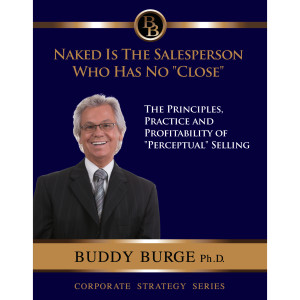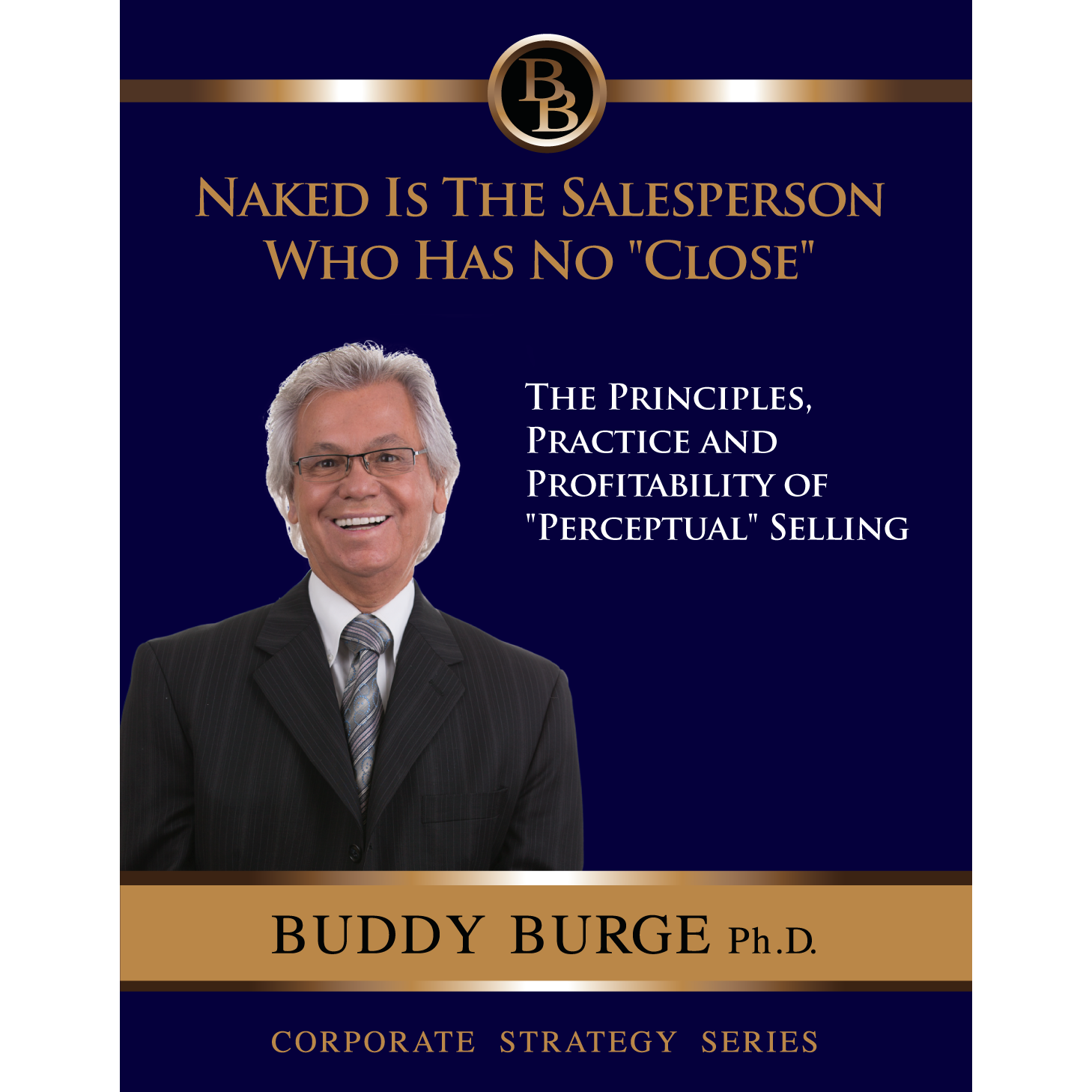The following excerpt is taken from Naked is the Salesperson who has no “Close”
The Twelve Core Concepts of Perceptual Selling
The High Stakes World of the Complex the Organizational Sale
As you may know, the sales process I have developed for the complex organizational sale is called Perceptual Selling.
There are twelve principles under-girding my approach to sales.
Sales, in the last several years have changed dramatically, especially the complex organizational sale.
The very structure of organizations to which we sell has become more complex.
The buying process has become a long, twisted chain of convoluted, interrelated decisions, impacting upon and involving several departments and disciplines in the customer’s organization.
The complex sale often has several decision makers, each seeing the issues of the transaction from his or her own perspective and operating in the context of his or her role and self-interest.
Customers are Demanding More Complex Relationships with Their Suppliers
They are drastically reducing their supply bases and asking the remaining vendors to take a more active role in their business process.
Increasing levels of complexity can also be found in the situations and problems customers face.
Their business environments are more competitive than ever.
Technological advances are radically altering their industries and markets, and their margins for error are shrinking, dramatically.
Most of our customers don’t have a high-quality decision-making process, and thus need to actually help them understand and address their own processes and issues.
In other words, the customer needs our help to figure out, process and complete the sale.
The Twelve Core Concepts of Perceptual Selling
1) You get delegated to the people you sound like.
If a traditional salesperson proves capable enough to get an audience with a decision maker, and he or she merely presents product features and functions to someone with no interest in those things.
What happens?
The salesperson will get delegated to someone else in the company who has a similar interest in features and functions, but who has no authority to make a purchase.
2) Diagnose before you prescribe
Take the time to diagnose before you prescribe.
Physicians will ask patients a series of questions and put them through a diagnostic process before offering medication.
Why should selling be any different?
The ability to ask intelligent, penetrating and diagnostic questions of a buyer is a key differentiator between great salespeople and traditional ones
We must ensure buyers retain ownership of their goals, problems and needs.
This helps the seller maintain credibility that would be lost if he or she were to give a “here’s what you need” speech without asking the buyer any questions.
3) Don’t give without getting.
Negotiation is not an event, it’s a process, and nearly every sale involves some sort of negotiation, especially when it comes to money.
Each side should take a “quid pro quo” approach, getting something in return for giving something.
When this is established early in the selling relationship, sellers can become more effective negotiators and deliver more profitable business.
4) You can’t sell to someone who can‘t buy.
Sellers must get to the person who can spend budgeted funds.
Ideally, your prospect is both a user of your product and the head of a department that has money budgeted to make a purchase.
5) Bad news early is good news.
Some sales cycles are extremely long, in part because the buyer is merely going through the motions, practicing due diligence on several vendors even though he or she already has a vendor in mind.
If you are not the predetermined vendor, however, bad news early is good news, finding out quickly that you have no real shot at the business gives you the chance to pull up stakes and pursue other winnable opportunities.
6) No goal means no prospect
A sales cycle cannot begin until the buyer shares a goal with the seller, at which time the seller can ask questions and empower the buyer with scenarios to understand what can be achieved with the product.
Without a goal, there can be no solution development, and, therefore, no prospect.
7) People are best convinced by reasons discover themselves.
Help your buyers reach their own conclusions.
In the process of answering the seller’s questions, buyers are able to discover their own reasons that prevent them from achieving a specific business result.
8) When selling your expertise can become your enemy.
Once you know something, it is difficult to have patience with or empathy for people who don’t know what you know.
If a salesperson is tempted to use his or her expertise without consulting the buyer about his or her goals or problems, the seller would be better suited not having that expertise.
Without it, he or she would ask more questions, and spend less time pontificating or trying to convince the buyer to make a purchase.
9) It is not a solution until the buyer says it is.
The only person who can call it a solution is the buyer.
The seller cannot and should not define a solution that is up to the buyer only.
The seller can help the buyer get there, but he or she must not get there first.
10) Make yourself equal, and then make yourself different, or you’ll just be different.
When asked to differentiate a product or service from a competitor’s offering, sellers need to respond with the question. “What do you hope to accomplish?”
If the buyer responds with a goal, the sale can proceed from there.
In other words, before differentiating an offering, sellers must get on equal footing with a prospect from a personal, competence and capability standpoint.
11) Don‘t close before the buyer is ready.
Once a seller closes a deal with a buyer, their relationship will never be the same.
Sellers should make sure they understand the buyer’s goals, and how they can be achieved through the use of the product.
The seller must understand the buyer’s current situation, and how he or she can help the buyer justify the cost of the purchasing decision.
12) Emotional decisions are justified by value and logic.
Buying is an emotional act, but one that must be entered into with logic and thought.
Salespeople need to be prepared to deal with both logic and emotion.
A buyer might make an emotional decision to purchase a product/service, but should be armed with the logical reasons behind that purchase so he or she can defend it to a superior.
Justifying Emotional Decisions
A man bought a very expensive, beautiful, fun-to-drive German car.
When asked why he purchased it, he used several different points as his rationale.
It will be a classic, it will go up in value, and it has an aluminum body that will never rust.
These were all logical reasons, but the truth is, he bought the car because he loved it at first sight, wanted to drive it, and felt he looked more handsome driving it.
If a close friend asked him why he bought the car, the emotional reason would flow along with the question “And don’t I look good in it?”
If a stranger asked, most likely the logical reasons would be offered.
If a buyer answers to no one and doesn’t care what others think, he or she can buy strictly on emotion.
Most people, however, need some kind of logic to explain to peers, superiors, subordinates and friends why they made a given purchase.
As a salesperson, you need to be ready to sell to both logic and emotion.
How ready to do that as a matter of course, are you?
For more on this topic, we recommend the following | |
 | Naked is the Salesperson |


![CropperCapture[362]](http://buddyburge.com/wp-content/uploads/2014/02/CropperCapture362-300x208.png)
![CropperCapture[363]](http://buddyburge.com/wp-content/uploads/2014/02/CropperCapture363-297x300.png)
![CropperCapture[364]](http://buddyburge.com/wp-content/uploads/2014/02/CropperCapture364-300x272.png)
![CropperCapture[365]](http://buddyburge.com/wp-content/uploads/2014/02/CropperCapture365-300x289.png)
![CropperCapture[366]](http://buddyburge.com/wp-content/uploads/2014/02/CropperCapture366-300x199.png)
